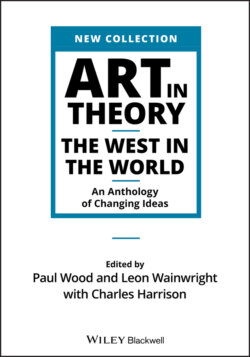Читать книгу Art in Theory - Группа авторов - Страница 128
IIB7 Ignatius Sancho (1729–80) Letter to Jack Wingrave
ОглавлениеThis second letter by Sancho has a sharper edge than his letter to Sterne. Composed over a decade later for the son of a friend working for the East India Company, who had written to his father from Bombay decrying the deceit and dishonesty of the native inhabitants, here Sancho squarely holds the British responsible for the ills of their colonies, east and west alike. In it Sancho evinces the double consciousness of a man who sees himself both as black and as British, valuing the freedom he has found in Britain but determined to condemn the racism on which so much of its growing prosperity was founded. Such letters have been described by Sancho’s modern editor as ‘the first published challenges to slavery and the slave trade by a person of African descent’ (Carretta, Letters, 1998, p. xxxi). As such, they make a telling counterpoint to texts IIB9, IIC1 and II6. The extracts are taken from Letters of the Late Ignatius Sancho, An African [1782], edited with an introduction and notes by Vincent Carretta, London: Penguin Books, 1998, pp. 130–1.
1778
In some one of your letters which I do not recollect – you speak (with honest indignation) of the treachery and chicanery of the Natives. – My good friend, you should remember from whom they learnt those vices:– the first christian visitors found them a simple, harmless people – but the cursed avidity for wealth urged these first visitors (and all the succeeding ones) to such acts of deception – and even wanton cruelty – that the poor ignorant Natives soon learnt to turn the knavish – and diabolical arts which they too soon imbibed – upon their teachers.
I am sorry to observe that the practice of your country (which as a resident I love – and for its freedom – and for the many blessings I enjoy in it – shall ever have my warmest wishes – prayers – and blessings); I say it is with reluctance, that I must observe your country’s conduct has been uniformly wicked in the East – West‐Indies – and even on the coast of Guinea. – The grand object of English navigators – indeed of all christian navigators – is money – money – money – for which I do not pretend to blame them – Commerce was meant by the goodness of the Deity to diffuse the various goods of the earth into every part – to unite mankind in the blessed chains of brotherly love – society – and mutual dependence:– the enlightened Christian should diffuse the riches of the Gospel of peace – with the commodities of his respective land – Commerce attended with strict honesty – and with Religion for its companion – would be a blessing to every shore it touched at. – In Africa, the poor wretched natives – blessed with the most fertile and luxuriant soil – are rendered so much the more miserable for what Providence meant as a blessing:– the Christians’ abominable traffic for slaves – and the horrid cruelty and treachery of the petty Kings – encouraged by their Christian customers – who carry them strong liquors – to enflame their national madness – and powder – and bad fire‐arms – to furnish them with the hellish means of killing and kidnapping. – But enough – it is a subject that sours my blood – and I am sure will not please the friendly bent of your social affections. – I mentioned these only to guard my friend against being too hasty in condemning the knavery of a people who bad as they may be – possibly – were made worse – by their Christian visitors. – Make human nature thy study – wherever thou residest – whatever the religion – or the complexion – study their hearts. – Simplicity, kindness, and charity be thy guide – with these even Savages will respect you – and God will bless you!
